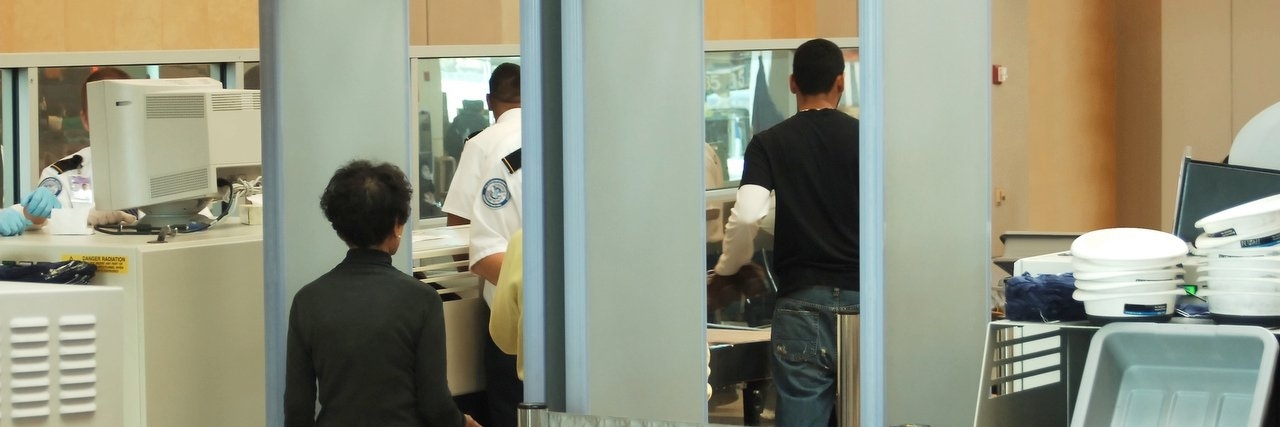Both of my sons have hemophilia, which is a rare genetic bleeding disorder. This disorder doesn’t allow their blood to clot and can cause internal bleeding, especially into the joints.
My youngest son, Caeleb, had some extreme complications with his hemophilia, which caused a great deal of damage to his knee and ankle. The complications he endured at such a young age aren’t exactly the norm for most young boys with hemophilia. In his case, he lost mobility for 18 months. He uses a wheelchair but could limp or hop for a few steps. Eventually, he was at the point where he could walk with just a hint of a limp, but long distances weren’t possible.
In order to treat Caeleb’s complications, we traveled between Albuquerque, New Mexico, and Denver often. Traveling with a wheelchair was necessary, and every time we went on a trip, my anxiety level skyrocketed. We would try our best to get through the airport without drawing extra attention to ourselves, but the looks and stares were constant. It wasn’t just little children who stared — I expected that. There were adults who would literally turn their heads and follow our every move. It was unnerving. I wanted to stare right back at them and ask, “Is there a problem?” — with a tremendous hint of sarcasm, of course.
As we arrived at the security gate in the Denver airport, Caeleb looked up at me and asked, “Mommy, why are people staring at me?” My heart broke in that instant. My son, the child who displayed strength beyond my wildest imagination, noticed the rudeness of others. I stopped his wheelchair, knelt down in front of him and said, “Son, it’s because they see how amazing you are.”
If you looked at him in his wheelchair, you probably would wonder why he needed the chair. What isn’t visible is the fact that his knee and ankle joints look like they belong to a much older man. The synovium (the protective tissue inside a joint) had been eaten away due to bleed after bleed, resulting in a restricted range of motion and pain. If people saw him attempt to walk, then perhaps they would have understood. But that wasn’t going to happen.
On another trip through the security gate at the Albuquerque Sunport with Caeleb in his wheelchair, I told a TSA agent that Caeleb could walk (more like “limp”) through the screening area. As soon as I said that, another TSA agent who was monitoring the area raised his voice and said, “The things people will do to get on the plane first! I can’t believe it!” He then stormed across to the other end of the security area loudly mumbling to himself. My heart must have stopped beating. I was absolutely stunned. I felt the stares of the people around me and could feel their judgment. I was sure they were thinking, “Thanks a lot for holding up the line.” Fortunately, my son didn’t hear the agent and was already on the other side of the screening area with my husband.
As I write this, my eyes are welling up with tears because I didn’t speak up for my son and for the many others who “look” OK as they go through security checkpoints. For a moment, I was actually embarrassed. Did everyone think like this insensitive man? In my heart, I was screaming, “He has hemophilia! Do you know the excruciating pain he has gone through due to the constant bleeding into his joint? How dare you assume I’m trying to cheat my way onto an airplane early.” The mama bear in me was raging inside, and I had to calm her down. It took months to make our appointments in Denver, and I didn’t want to get delayed by a tense discussion with the TSA. I had to move on.
It’s been quite some time since that incident at the airport, and I’ve often thought about the advice I would offer that TSA agent. Here’s what I would tell him:
Your eyes won’t always see the battle raging inside a person’s body. Some illnesses aren’t visible to the naked eye. I hope the next time you start to judge why someone is in a wheelchair, is using crutches or needs a therapy dog, you’ll stop for a moment and imagine the battle they’re fighting. Give thanks for your health and think twice before you speak.
Follow this journey on 2 Brothers With Hemophilia.
Tell us about a stranger’s comment about your (or a loved one’s) disability, disease or mental illness that has stuck with you for one reason or another. Why has it remained significant to you? If you’d like to participate, please check out our Submit a Story page for more about our submission guidelines.
Lead photo source: Thinkstock Images

